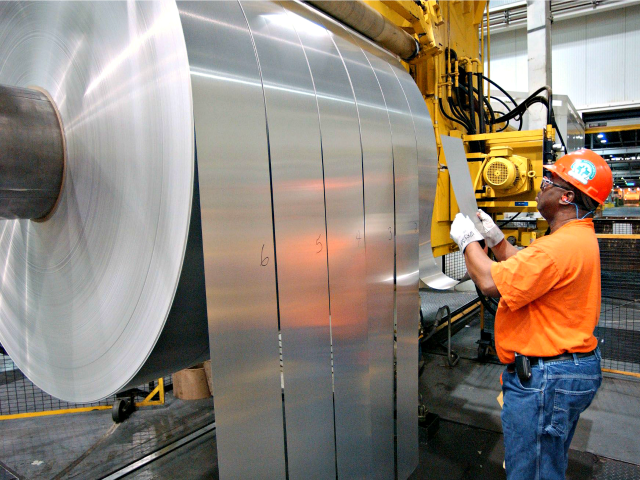WASHINGTON, D.C.–On Thursday President Donald Trump signed a memorandum highlighting the importance of a new Department of Commerce investigation into aluminum imports to the U.S. and the threat to national security in light of global overcapacity and increasing U.S. military demand for high quality aluminum.
“Imports have been flooding into the aluminum industry,” said Commerce Secretary Wilbur Ross as to why the Commerce Department initiated the investigation. Ross made the comments to reporters on Thursday at the White House.
The Department of Defense uses high purity aluminum in the construction of the F-35, F-18, and C-17 joint strike fighters, Ross highlighted. It is also used in armor plating of military vehicles, combat vessels, and missiles. He added that the percentage of aluminum content used in the next generation of military vehicle armor plating could increase 60 percent.
The problem? “There’s only one American smelter that produces the high purity aluminum needed for these uses.” The company that runs that smelter has been having problems with a trade case. In addition, eight other U.S. smelters have closed or curbed production since 2015. Only two fully operational smelters remain in the U.S. today.
Ross stated:
U.S. imports of aluminum increased by 18 percent in 2016 to 6,020,000 tons while at the same time U.S. production decreased. In 2016 imports took an estimated 55 percent of our entire market. This is the largest U.S. market share for imports ever and is approximately a 40 percent increase form 2012.
China makes up 6.2 percent of the U.S. market share, Russia 12.2 percent, United Arab Emirates 9.1 percent, and Canada is also a large player, according to Ross. The UAE and Canada benefit from very cheap energy.
Ross said the aluminum industry has been seeing a lot of turmoil and distress recently. This coupled with trade complaints being filed led Commerce to open the section 232 investigation on Wednesday.
Ross specifically addressed China’s rocketing aluminum production:
China’s subsidies have created overcapacity which has depressed global prices for aluminum. Over the past 15 years, Chinas primary aluminum production has increased from 11 percent of world’s production back in, 15 years ago in 2002, to now 55 percent. So they quintupled their market share of global aluminum production.
Only 2.4 percent of world capacity now comes from the U.S., said Ross. China’s excess aluminum manufacturing capacity is over eight million tons. That excess capacity alone is 1.5 times U.S. total aluminum consumption in a given year.
U.S. production has dipped to 1952 levels, and just under 1/3 of what was produced in 2001. Ross continued, “Ten years ago, U.S. produced approximately 6.7 percent of the world’s aluminum, now, as I mentioned, it’s 2 and a fraction percent.” Actual U.S. production is now a mere 1.4 percent of world production according to the Secretary.
“At the very same time that our military is needing more and more of the very high quality aluminum, we’re producing less and less of everything and only have the one producer of aerospace quality aluminum,” said Ross, citing this as part of the reason for the new investigation.
Ross said that in a time of peace the U.S. military currently has enough aluminum to meet their needs; however, he said the question is, “What happens if have to mobilize, if we have to get into a different environment?”
The U.S. has recently taken military action in Syria and against ISIS in Afghanistan. The grave threat of North Korea’s ballistic missile, nuclear, and ICBM programs have also brought the threat of potential increased military action to the forefront.
The investigation must be completed within 270 days, but Ross said he hopes it will take much less time.
Questions addressed in the course of the investigation will include, as listed by Ross: What’s the domestic production needed for projected national defense requirements; what is the domestic industry’s capacity to meet those requirements; the related human and material resources, the importation of goods in terms of their quantities and use; the close relation of national economic welfare to U.S. national security; the loss of skills or investment, substantial unemployment, and decrease in government revenue and the impact of foreign competition on the domestic industry and the impact of displacement of any domestic products by excessive import.
Upon conclusion of the investigation Ross will present the President with a recommendation and, as Ross put it, “He’ll either accept it or he will not.”
President Trump signed a memorandum Thursday afternoon on Aluminum Imports and Threats to National Security. During the signing he said of Ross, “He is quickly demonstrating to the entire world that we’re serious about protecting our jobs and industries like aluminum.”
He said he would like to see the U.S. aluminum industry “where it was or even beyond if that’s possible,” adding that the industry has been “severely damaged by unfair foreign trade. Cheap subsidized foreign exports have flooded into the market, destroying thousands of great American jobs.”
The President said it would be “absolutely insane” to use foreign producers for U.S. military aluminum needs.
Last week President Trump also signed an executive order on steel and that industry’s potential national security threat implications. The steel industry similarly faces global excess capacity.
Follow Michelle Moons on Twitter @MichelleDiana

COMMENTS
Please let us know if you're having issues with commenting.